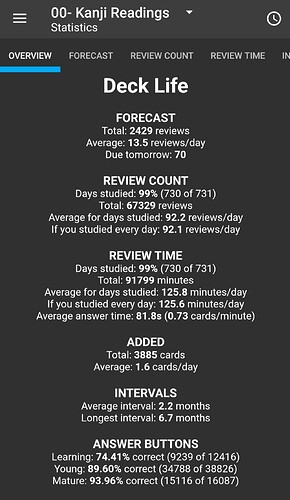Like the title says. I studied kanji for around 2 (and a bit) hours every single day for two years. This is a direct follow up of my previous post -
Here’s what happened.
New kanji that I learned - 2533
Individual reviews of kanji - 67329
Seeing as though my focus was writing, and I wrote each kanji 10 times per review, that makes close to 700000 individual kanji written.
“Why?”
I wanted to see if writing was more effective than mnemonics… Also my partner is Japanese. As this was the second year, it was also simply an extension of my first year of kanji study.
“Result worth it?”
Without a doubt, yes. Of those 2533, I can write about 99% of them. There are also about 300 extra I can write based on common radicals/being almost identical to one I have already learned/not bothering to learn the equivalent ‘rarer’ kanji with the same meaning. Example, 島 and 嶋. They both mean island, they both have exactly the same radicals, they both have the same kun/on-yomi, one is simply far rarer. Knowing one while being ‘aware’ of the other means you also know the second, and are able to draw it. There are probably at least 100 kanji like this.
“What order did you learn them in?”
I did japanese school grade order. This is usually not recommended, but I wanted to try to understand why this order is used for natives, so I used it. In hindsight I am very glad that I did, as learning easy ‘concepts’, rather than learning easy ‘kanji’ was definitely more useful as you progress further and further. You start to notice that each new difficult kanji is just a unique nuance of something you’ve already learned.
“Can you actually read now?”
I would say that I can read 98% of anything, and almost 100% of topics that I enjoy (as those kanji tend to repeat a lot and I learned them after sidetracking from school level kanji). I tend to come across about 2 new kanji per book series recently. This is primarily because each author probably has a few artistic words that they tend to use over the span of their novels. If a series has the same author all the way through, generally there will be no new kanji by the 2nd/3rd book in the series, as that particular author has exhausted their specific writing flair.
“Would you recommend it?”
Knowing the basic concepts before learning more advanced kanji is certainly helpful, and you are exposed to regular patterns in a manner that allows for later recognization of sound patterns that occur across the entire language. This occurs equally often for everyday words as it does with onomatopoeia, which very frequently have a base kanji verb/adjective meaning that is just doubled up to form a new word. Examples, 艶(つや)めく ‘lustre’, つやつや ‘glossy’, 煌(きら)めく ‘gleam’, きらきら ‘glisten’.
“What about the kanji you don’t know still?”
I am going to drop my number down to only 1 or 2 new kanji a day from now on, as I want to focus more on 四字熟語 for a while (in preparation for the kanken kanji exam). As far as actual reading goes though, the only area natives still beat me out on quite regularly is names. Particularly first names where the readings are far less predictable. I feel like this will be a lifelong struggle… Just like it is for Japanese people  .
.
“I don’t have enough time for that!”
It really depends what you will get out of it. If you learn the kanji, including all of their readings, you are automatically learning up to 10 or more words for each new kanji, as you will build a far stronger intuition for new words the first time you see them, if you already know the individual kanji and their meanings. You’ll also be far less likely to forget new kanji compounds. In this respect, it may even be more time efficient than learning individual words.
Conclusion - As with my 1 year post, the purpose of this update isn’t to pressure anyone into studying harder, or even trying the way I studied. It’s just to show that (probably) any study method will work if you stick at it.
Last disclaimer - The 99% studied instead of 100% is due to a 1 day period that I lost my phone, panicked and had to do 2000 reviews on my computer as I hadn’t backed up my Anki data in a while and then miraculously found my phone the day later, synching to the state it was when I had a normal number of reviews. @Jake can attest to this, as I sent him many panicked messages that day 




